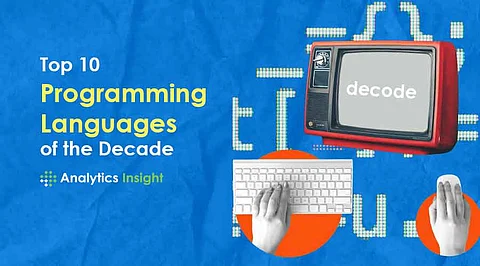

The tools that programmers use to create software applications, websites, games, and other things are called programming languages. They are constantly evolving and adapting to the changing needs and preferences of the industry and its users.
1. Python: Python is a general-purpose, high-level, interpreted, and dynamic programming language that supports multiple paradigms such as object-oriented, functional, procedural, and imperative. It is known for its simple and elegant syntax, readability, and productivity. Python has been consistently ranked as the most popular and influential programming language of the decade by various sources.
2. Java: Java is a general-purpose, compiled, object-oriented, and concurrent programming language that runs on the Java Virtual Machine (JVM). It is designed to be portable, robust, secure, and efficient. Java has been one of the most widely used and influential programming languages of the decade by various sources.
3. JavaScript: JavaScript is a scripting language that runs in web browsers and on servers (Node.js). It is used to create dynamic and interactive web pages and applications. JavaScript supports multiple paradigms such as object-oriented, functional, event-driven, and asynchronous. JavaScript has been one of the most popular and influential programming languages of the decade by various sources.
4. C#: C# is a general-purpose, compiled, object-oriented, and multi-paradigm programming language that runs on the .NET Framework or .NET Core. C# has been one of the most widely used and influential programming languages of the decade by various sources.
5. C++: C++ is an extension of C that adds object-oriented features such as classes, inheritance, polymorphism, and templates. It is a low-level, compiled, and powerful programming language that offers direct access to hardware resources and memory management. C++ has been one of the most widely used and influential programming languages of the decade by various sources.
6. PHP: PHP is a scripting language that runs on web servers and is mainly used for web development. It is embedded in HTML and can interact with databases such as MySQL or PostgreSQL. PHP supports multiple paradigms such as procedural, object-oriented, and functional. PHP has been one of the most popular and influential programming languages of the decade by various sources.
7. SQL: SQL is a domain-specific language that is used to manipulate and query data stored in relational databases. It is based on relational algebra and calculus and consists of statements such as SELECT, INSERT, UPDATE, DELETE, and JOIN. SQL has been one of the most popular and influential programming languages of the decade by various sources.
8. R: R is a scripting language that is used for statistical computing and graphics. It is based on the S language and supports multiple paradigms such as functional, object-oriented, and vectorized. R has been one of the most popular and influential programming languages of the decade by various sources.
9. Swift: Swift is a general-purpose, compiled, object-oriented, and multi-paradigm programming language that runs on iOS, macOS, watchOS, tvOS, and Linux. It is designed to be safe, expressive, and fast. Swift has been one of the most popular and influential programming languages of the decade by various sources.
10. Ruby: Ruby is a general-purpose, interpreted, object-oriented, and dynamic programming language that supports multiple paradigms such as functional, imperative, reflective, and metaprogramming. It is known for its expressive and elegant syntax, readability, and productivity. Ruby has been one of the most popular and influential programming languages of the decade by various sources.
Join our WhatsApp Channel to get the latest news, exclusives and videos on WhatsApp
_____________
Disclaimer: Analytics Insight does not provide financial advice or guidance. Also note that the cryptocurrencies mentioned/listed on the website could potentially be scams, i.e. designed to induce you to invest financial resources that may be lost forever and not be recoverable once investments are made. You are responsible for conducting your own research (DYOR) before making any investments. Read more here.
